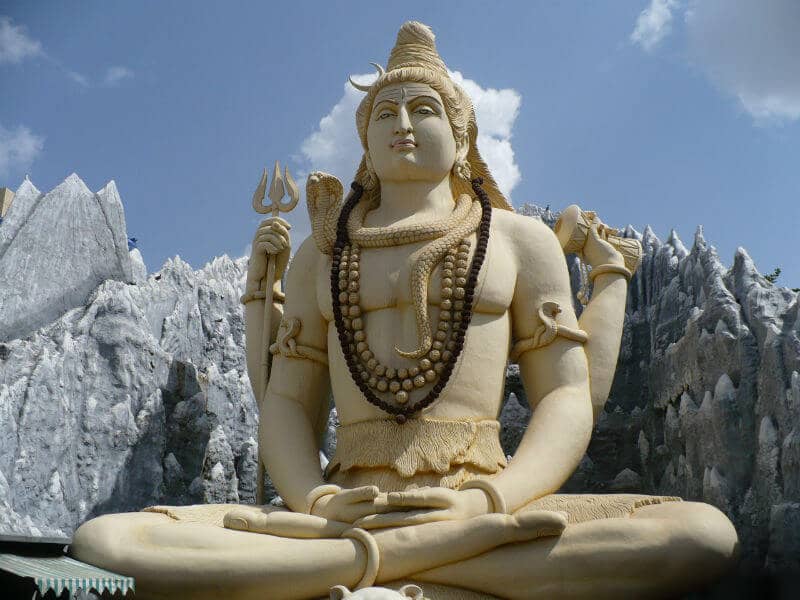A spokesperson for the ashram said the Hindu master discovered on October 9 that he had advanced intestinal cancer. Three medical teams of radiologists and oncologists in Hawaii, Washington State and California all concurred that even the most aggressive treatment regimens would not prove effective, and estimated he had just a few months to live. Consequently, Subramuniyaswami declined any treatment beyond palliative measures, and made the decision to follow the Indian yogic practice, called Prayopavesa in Sanskrit scripture, to abstain from nourishment and take water only from that day on. He died on the 32nd day of his self-declared fast, passing on quietly at 11:54 pm on November 12, 2001, surrounded by his 23 monastics.
Upon news of his impending passage, prayers and worship were offered in hundreds of temples around the world by tens of thousands of Hindus. The suddenness of the events especially stunned the 2.5 million Tamils of Sri Lanka, for whom Subramuniyaswami, the successor of Lanka's great guru Yogaswami, is their hereditary spiritual leader.
At his passing, Subramuniyaswami consoled his sorrowful monks, telling them, "Don't be sad, soon I will be with you 24 hours a day, working with you all from the inner planes." Bereaved devotees arriving at the ashram heard the same message, and by the time of the passing, a great peace had descended upon the ashram and all connected with it. His designated successor, Satguru Bodhinatha Veylanswami, was duly installed as guru of the ashram, formally known as Kauai Aadheenam.
Few in the Hindu world would not recognize the tall, white-haired American who had gained prominence over the decades for his practical and clear-minded books replete with explanations of everything Hindu, from the most basic beliefs and daily practices to the loftiest refined philosophy and yoga techniques. He was equally famous as founder and publisher of Hinduism Today, an award-winning, international, full-color magazine, respected for its authoritative reporting on Hindu events, institutions, personalities, issues and controversies around the world.
Among his innovative projects are the creation of Iraivan Temple on Kauai, the first all-stone, hand-carved granite temple ever built in the West, the founding of Hindu Heritage Endowment to perpetually fund worthy Hindu institutions and his participation in numerous international conferences on religion, peace and interfaith harmony. He inspired and guided the construction of dozens of temples among Hindu communities outside of India, especially in America, Canada, Europe, Mauritius, Malaysia, Australia, New Zealand and Fiji.
From his ashram in Hawaii, Subramuniyaswami continued to follow his own guru's instruction to bring Saivism to the Western world by teaching others to "know thy Self by thyself" and thus "see God Siva everywhere."
Among his honors are being named one of 25 "presidents" of religion at the 1996 Parliament of the World Religions held in Chicago, and receiving the U Thant Peace Award while attending the Millennium Peace Summit of World Religious and Spiritual Leaders held at the United Nations in August, 2000. This award was previously given to the Dalai Lama, Nelson Mandela, Mikhail Gorbachev, Pope John Paul and Mother Teresa. On August 25, 2000, he addressed 1,200 spiritual leaders during the UN events in New York.
"Just before his passing," said the monastery spokesperson, "He asked devotees worldwide to carry his work and institutions forward with unstinting vigor, to keep one another strong on the spiritual path, to work diligently on their personal spiritual disciplines and to live every moment in harmony and love for all peoples. His monks, gathered from six nations, forged in the fires of his wisdom and love, are well-prepared to keep his mission potent and effective. Equally, his family devotees are pure, one-minded and deeply committed. These two communities will continue the work together: building the Iraivan Temple, managing the Spiritual Park in Mauritius, shepherding souls on the Saivite path of enlightenment, continuing the many publications, teaching children their Saivite Hindu religion, preserving traditional culture and art, protecting Hindu priests and the indigenous faiths of the world, contributing to our local Kauai community, guiding the future of Hinduism around the globe and working to reduce violence, child-beating and spouse abuse."

